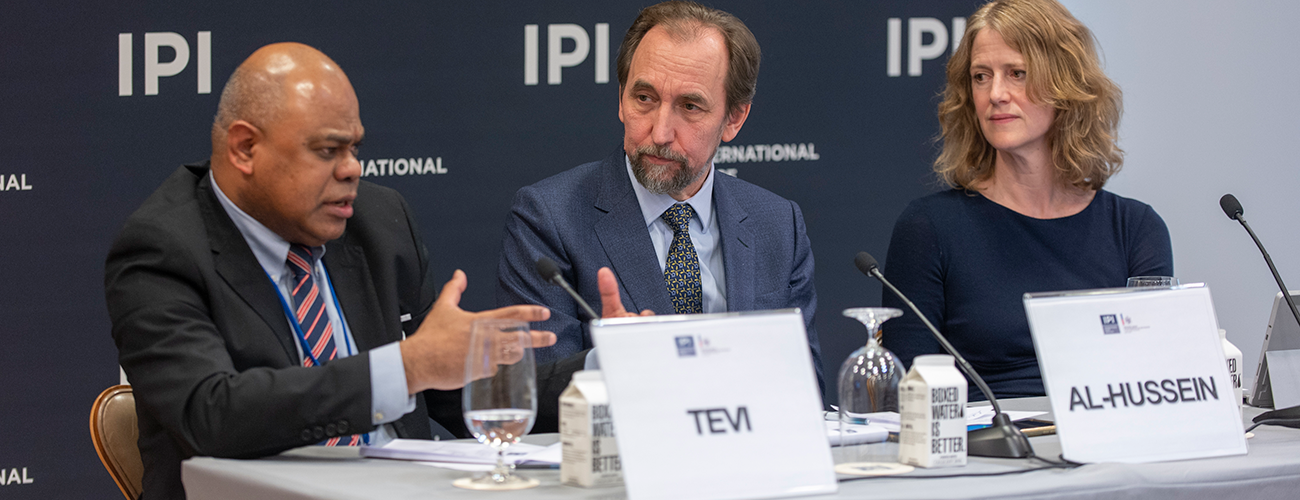The recent Climate Change Conference (COP27) in Sharm el-Sheikh made progress in some areas, but not nearly enough to limit warming to 1.5 degrees Celsius. The world is still off-track to avert the most dangerous consequences of global warming. The latest study of the Intergovernmental Panel on Climate Change (IPCC), the “Climate Change 2023 Report,” brings into sharp focus the losses and damages being experienced now and expected to continue into the future, which are hitting the most vulnerable people and ecosystems especially hard. As the UN Secretary-General has stated, climate action is needed on all fronts.
The current way of life based on carbon is unsustainable and needs to change, affirmed IPI President Zeid Ra’ad Al Hussein during the policy forum on “Legal Avenues to Fight Climate Change,” cohosted by IPI and the Permanent Mission of the Principality of Liechtenstein to the UN on March 30th.
To accelerate climate action, there is growing momentum to explore legal avenues to address the climate emergency. Climate litigation is on the rise at the international, regional, and national levels, and several clear legal pathways are being pursued.
A request for an advisory opinion on climate change from the International Court of Justice (ICJ) was adopted by the UN General Assembly by consensus on March 29th. Ambassador of Vanuatu Odo Tevi outlined the lengthy but rewarding process it took to pass the resolution, spearheaded by Vanuatu which is among the Pacific Island countries facing the brunt of the climate crisis.
Climate change imposes an enormity of challenges on small island states. Payam Akhavan, Counsel to the Commission of Small Island States on Climate Change and International Law discussed the December 12th request for an advisory opinion on the impact of climate change on oceans from the International Tribunal for the Law of the Sea (ITLOS). Akhavan provided a brief overview of the ITLOS proceedings, noting the prospect of a hearing in September 2023 which would unfold in parallel with the ICJ process. The ITLOS is anticipated to have an advisory opinion before the ICJ holds its first hearing, which could shape jurisprudence and raises questions surrounding harmonization between international judicial bodies.
Proposals to make ecocide—the destruction of the environment—a crime under international law are currently being considered. Kate Mackintosh, Executive Director of the Promise Institute for Human Rights highlighted Ukraine’s use of ecocide in its criminal code since the late 1990s and noted the study of the effects of sea-level rise on the law of the sea, statehood, and protection of affected persons already underway.
Global solidarity is key to preventing vulnerable countries from choosing between responding to climate change and their own development, affirmed Romanian Foreign Minister Aurescu.
This event is a continuation of a conversation on the topic of legal avenues to fight climate change which commenced in December 2021.
Opening Remarks:
H.E. Christian Wenaweser, Permanent Representative of Liechtenstein to the UN
Speakers:
H.E. Bogdan Aurescu, Minister of Foreign Affairs of Romania; Member, UN International Law Commission; Professor of International Law, University of Bucharest (pre-recorded message)
H.E. Odo Tevi, Permanent Representative of Vanuatu to the UN
Kate Mackintosh, Executive Director, Promise Institute for Human Rights
Payam Akhavan, Professor of International Law, Massey College, University of Toronto; Member of the Permanent Court of Arbitration; Counsel to the Commission of Small Island States on Climate Change and International Law
Moderator:
Zeid Ra’ad Al Hussein, President and Chief Executive Officer, International Peace Institute








